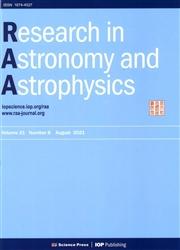The Multi-parameter Test of Gravitational Wave Dispersion with Principal Component Analysis
IF 2.8
4区 物理与天体物理
Q3 ASTRONOMY & ASTROPHYSICS
引用次数: 0
Abstract
In this work, we consider a conventional test of gravitational wave (GW) propagation which is based on the phenomenological parameterized dispersion relation to describe potential departures from General Relativity (GR) along the propagation of GWs. But different from tests conventionally performed previously, we vary multiple deformation coefficients simultaneously and employ the principal component analysis (PCA) method to remedy the strong degeneracy among deformation coefficients and obtain informative posteriors. The dominant PCA components can be better measured and constrained, and thus are expected to be more sensitive to potential departures from the waveform model. Using this method we analyze ten selected events and get the result that the combined posteriors of the dominant PCA parameters are consistent with GR within 99.7% credible intervals. The standard deviation of the first dominant PCA parameter is three times smaller than that of the original dispersion parameter of the leading order. However, the multi-parameter test with PCA is more sensitive to not only potential deviations from GR but also systematic errors of waveform models. The difference in results obtained by using different waveform templates hints that the demands of waveform accuracy are higher to perform the multi-parameter test with PCA. Whereas, it cannot be strictly proven that the deviation is indeed and only induced by systematic errors. It requires more thorough research in the future to exclude other possible reasons in parameter estimation and data processing.用主成分分析法对引力波频散进行多参数测试
在这项工作中,我们考虑了引力波(GW)传播的传统测试,该测试基于现象学参数化色散关系来描述引力波传播过程中可能偏离广义相对论(GR)的情况。但与以往常规测试不同的是,我们同时改变多个形变系数,并采用主成分分析(PCA)方法来弥补形变系数之间的强退化性,从而获得信息丰富的后验。主成分分析法可以更好地测量和约束主成分,从而对波形模型的潜在偏差更加敏感。利用这种方法,我们分析了 10 个选定的事件,结果发现主要 PCA 参数的综合后验在 99.7% 的可信区间内与 GR 一致。第一个主要 PCA 参数的标准偏差是原始前序分散参数标准偏差的三倍。然而,用 PCA 进行多参数测试不仅对可能偏离 GR 的情况更敏感,而且对波形模型的系统误差也更敏感。使用不同波形模板得出的结果存在差异,这表明使用 PCA 进行多参数测试对波形精度的要求更高。不过,目前还不能严格证明偏差确实且仅由系统误差引起。今后还需要进行更深入的研究,以排除参数估计和数据处理中可能存在的其他原因。
本文章由计算机程序翻译,如有差异,请以英文原文为准。
求助全文
约1分钟内获得全文
求助全文
来源期刊

Research in Astronomy and Astrophysics
地学天文-天文与天体物理
CiteScore
3.20
自引率
16.70%
发文量
2599
审稿时长
6.0 months
期刊介绍:
Research in Astronomy and Astrophysics (RAA) is an international journal publishing original research papers and reviews across all branches of astronomy and astrophysics, with a particular interest in the following topics:
-large-scale structure of universe formation and evolution of galaxies-
high-energy and cataclysmic processes in astrophysics-
formation and evolution of stars-
astrogeodynamics-
solar magnetic activity and heliogeospace environments-
dynamics of celestial bodies in the solar system and artificial bodies-
space observation and exploration-
new astronomical techniques and methods
 求助内容:
求助内容: 应助结果提醒方式:
应助结果提醒方式:


